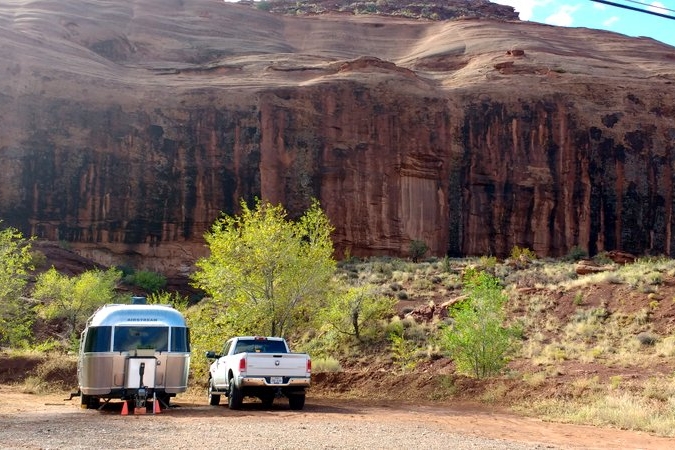Study Shows Family Savings From RV Travel

A new study conducted by an outside, independent firm has found that RV vacations cost much less than other types of vacation travel, even when factoring in fuel prices and the cost of RV ownership, the RV Industry Association (RVIA) reported.
According to the study, commissioned by Go RVing and RVIA, CBRE Hotels Advisory Group found there are average cost savings of up to 60% for a four-person travel party, while a two-person travel party saves up to an average of 46%, depending on factors such as the type of RV and type of vacation.
For the most common type of RV, the lightweight travel trailer, the average cost per day of the 4-person camping vacation was found to about 48% less than the average daily cost of a comparable 4-person air/hotel vacation and be about 34% less expensive than the average daily cost of comparable 4-person car/hotel combination vacation.
For the fastest growing segment of RVs, Class B motorhomes, the average cost per day of the 4-person camping vacation was found to about 49% less than the average daily cost of a comparable 4-person air/hotel vacation and be about 35% less expensive than the average daily cost of comparable 4-person car/hotel combination vacation.
“Consumers continue to place a priority on traveling and spending time with family and this study confirms the fact that RV vacations are one of the most economical ways to travel,” said RVIA President and CEO Craig Kirby. “RV vacations provide freedom from many of the traditional hassles of travel, while also providing greater control over your budget.”
The study analyzes vacation costs using two sets of hypothetical travel groups: a four-person travel party of two adults and two children, and a two-person travel party of two adults. The study compared different methods of travel, including a:
- folding camping trailer
- lightweight travel trailer
- compact motorhome
- Class C motorhome
- Class A motorhome
- traveling in a personal car, staying at hotels/motels and eating meals in a restaurant
- traveling by airline, renting a car at the destination, staying at hotels/motels and eating meals in restaurants
- and traveling in a personal car or airline (as appropriate), staying at a rental house/condominium and eating the majority of meals in the rental unit.
The Class A motorhome, typically the largest and most luxurious RV, was compared to travel options such as flying first class, renting a premium car, staying in upscale hotels/resorts and eating meals in restaurants.
The study analyzes major costs vacationers incur traveling to nine popular vacation destinations. Specific routes and stops were analyzed to evaluate the true comparison of vacation types. For each destination, researchers analyzed vacations lasting three, seven and 14 days.
“It was important for us to look at real itineraries for travelers and quantify what real families can expect to save by choosing RVing as their preferred mode of travel,” said Go RVing Chief Marketing Officer Karen Redfern. “Beyond the cost savings, RVing also allows families the unique ability to travel whenever and wherever desired while avoiding common travel hassles and fostering an increased sense of togetherness, control, flexibility, convenience and accessibility to the great outdoors.”
For a family of four traveling from Dallas to the Grand Canyon for a 14-day vacation, the trip would cost $8,801 if the family took a plane, rented a car and stayed in hotels. For the same vacation in Class C motorhome, the vacation would cost $5,627, a 37% savings.
For that same family of four to take a 7-day vacation from Oklahoma City to Corpus Christi, Texas, the family would expect to pay $5,279 to fly, rent a car and stay in a hotel. The same vacation in a lightweight travel trailer would cost only $2,383, a savings of 55%.
Similarly, a family of four taking a luxury 7-day vacation traveling from Washington, D.C. to Cape Cod, Massachusetts, with first class air travel, car rental, a hotel would spend $8,201. For the same vacation in a luxury Class A motorhome, the family would spend $4,981, a 39% savings.
Even when airfare is removed and a family road trip staying in hotel is compared to an RV vacation, the savings are significant. A family of four taking a 7-day vacation from Atlanta, Georgia, to Orlando, Florida, would spend $3,216 for a road trip in a family car and staying at hotels and motels. The same vacation in a folding camping trailer would cost $1,712, a 47% savings.
The study also looked at travel for a party of two. In one example, a couple traveling from Seattle, Washington, to Yellowstone National Park would expect to spend $11,328 for a 14-day vacation traveling via airplane, rental car, and vacation home rental. A similar vacation in a Class B motorhome for the couple would cost $4,606, a savings of 60%.
The study included analysis of how fluctuations in fuel prices could affect the economic advantages of RV travel. Researchers found that for a four-person travel party it would take a rise in fuel prices to nearly $21 per gallon for a Class C motorhome vacation to be more expensive than the least expensive non-RV vacation. The Class A motorhome vacation remains less expensive than the upscale non-RV vacation until the respective fuel costs increase between 350% and 375%, or between $25.20 and $26.60 for diesel fuel and between $17.06 and $18 for regular gasoline.
“We are of the opinion that fuel costs will likely not approach the levels required to significantly impact the affordability of RV vacations versus other modes of travel in the foreseeable future. As such, RV vacations are generally less expensive than the comparable non-RV vacation types. Therefore, price spikes in fuel costs should not adversely affect the decision on whether or not an RV vacation is taken versus other types of vacations,” the study states.
Research by Go RVing and the RV Industry Association shows that when fuel prices are higher, RVers save on fuel costs by driving fewer miles, taking trips closer to home, and staying longer in one destination.
CBRE Hotels Advisory was commissioned by Go RVing to provide an objective comparison between the cost of a summer vacation using RVs and the cost of other types of vacations during that same timeframe. CBRE factored in an estimated cost of RV ownership based upon published data regarding average ownership periods, residual values, annual days of use, insurance and other costs of ownership, as well as any applicable tax benefits.
Members can view the full report here.


